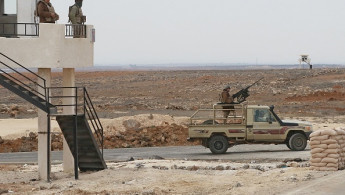Iranian-backed militants' strike on US troops threatens Jordan, regional escalation
Saturday's strike by Iranian-backed Iraqi militants, which killed three US troops and injured over thirty more along the Jordan-Syrian border, threatens a regional escalation, analysts warned on Monday.
The strike was the first time that US troops were killed since Hamas's surprise 7 October attack on Israeli military bases and settlements in and around "the Gaza envelope", which sparked a low-grade regional conflict spanning from Yemen to Lebanon.
US President Joe Biden said that US forces would hold those accountable at a "time and manner of our choosing," without specifying further.
Saturday's attack comes after three months of intensifying strikes against the US and its allies in the Middle East in response to its support for Israel's military operation in Gaza, which has left over 26,000 Palestinians dead, most of whom were women and children.
Iranian-backed militias have launched over 150 attacks against US soldiers in Iraq and Syria over the last three months, while the Houthis have blocked ships from crossing the Red Sea in apparent solidarity with Gaza. While supporting these attacks Iran also officially denies leading or ordering them.
In response, the US has carried out its own strikes on Iranian elements in Iraq and Syria, as well as struck Houthi targets in Yemen.
US defence officials have said that the attacks by Iranian-linked elements are aimed at evicting the US from its positions in Iraq and Syria.
The US and Iraq have since begun formal talks on the withdrawal of US troops from the country – a decision that US officials said had been taken before 7 October.
According to reporting by Al-Monitor citing anonymous US officials, senior US officials have floated a proposal to help create an alliance between the Kurdish-led Syrian Democratic Forces (SDF) with the Assad regime to precipitate a US withdrawal from Syria.
It is unclear how closely Iran was involved in Saturday's operation, as while Iran backs the Iraqi resistance in Syria, it has its own command structures. Iran has publicly distanced itself from the strike.
In the past, the US has struck back at Iraqi-backed forces in Syria and Iraq, most recently killing a senior commander in the Harakat Hezbollah al-Nujaba in Baghdad on 4 January. However, before Saturday, no US service members had been killed by these strikes.
Jordan stuck between a rock and Syria
The strikes on the Jordanian border, which US officials claim occurred in Jordan and Jordanian say were in Syria, come after months of pressure on Jordan by Iranian-backed elements in Syria.
Jordan, a top US ally in the region, has seen a marked increase in smuggling attempts across its border with Syria, originating from what it says are Iranian-backed groups. The wave of drug smuggling attempts has, at times, erupted into clashes, leaving at least one Jordanian border guard dead and several injured.
Jordan has publicly said that it believes Iranian-backed elements to be behind the smuggling attempts and has said that the drug trafficking is a direct security threat to Jordan.
"I believe that the operation is a double blow to Jordan and the US together, even if it is more directed against the US," Saud al-Sharafat, the director of the Amman-based Shorufat Center for Globalization and Terrorism Studies, told The New Arab.
Al-Sharafat continued that Saturday's strike comes in the context of a broader regional conflict between the US and Iran and its associated allies.
"It takes place in arenas far from Iranian soil," he explained.
Jordan has also come under pressure from its population for its close relationship with the US, which provides weaponry and political support for Israel.
Jordan hosts a US military base in the northeast of the country, which is used by the US for aerial missions in Iraq and Syria, and has signed defence cooperation agreements which allow for the presence of US troops in the country.
Since the start of Israel's war on Gaza, protesters have held multiple demonstrations in front of the US embassy in Amman, railing against US support for Israel.
After the border strike over the weekend, Jordan called for the US to send it Patriot missile defence batteries to ensure its security.





 Follow the Middle East's top stories in English at The New Arab on Google News
Follow the Middle East's top stories in English at The New Arab on Google News

![MP Essam Diab's pursuit to block TikTok in Egypt has revived an already ongoing debate in the country. [Getty]](/sites/default/files/styles/image_330x185/public/1230748046.jpeg?h=a5f2f23a&itok=-8MqBLLC)
